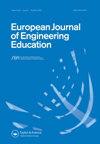An innovative engineering curriculum to train next generation water engineers: a successful case study
IF 2.8
Q2 EDUCATION & EDUCATIONAL RESEARCH
引用次数: 0
Abstract
ABSTRACT Presented here is a novel engineering degree initiative established at Charles Sturt University (CSU), Australia. This program embodies emerging trends and prospects in engineering education, aspiring to nurture adept engineers well-prepared for practical application. Furthermore, this paper delves into the application of this program for training the next generation of water engineers, equipping them with indispensable skills to confront novel challenges. The CSU Engineering program incorporates several attributes commonly found in progressive engineering curricula. It places significance on work-based learning and encompasses an extensive 6000-hour industrial work placement. This emphasizes student self-reflection, engineering design, robust academic leadership, the integration of educational innovation and novel tools for scholastic exploration, and comprehensive student assessment. Gaining robust industry support, the CSU Engineering program garners recognition as an exemplar for future education. The adaptability, professionalism, responsibility, and leadership exhibited by CSU cadets are highly regarded by their industrial partners. Feedback highlights the consistent advancement of cadets' soft skills, spanning teamwork, communication, leadership, community engagement, and interpersonal relations. Notably, CSU cadets receive substantial remuneration from their industrial engagements. Despite the challenges posed by COVID-19 restrictions, the CSU Engineering program continues to operate seamlessly with minimal disruption.培养下一代水工程师的创新工程课程:成功案例研究
本文章由计算机程序翻译,如有差异,请以英文原文为准。
求助全文
约1分钟内获得全文
求助全文
来源期刊

European Journal of Engineering Education
EDUCATION & EDUCATIONAL RESEARCH-
CiteScore
7.30
自引率
13.00%
发文量
64
期刊介绍:
European Journal of Engineering Education is published six times a year in print and electronic editions and provides an essential forum for dialogue between researchers and specialists in the field of engineering education, at European and worldwide levels. European Journal of Engineering Education is the Official Journal of SEFI, the Socièté Européenne pour la Formation des Ingénieurs (the European Society for Engineering Education). SEFI is a non-governmental organization whose aims are to develop information about engineering education, to improve communication and exchange between professors, researchers and students and to promote cooperation between the various institutions concerned with engineering education.
 求助内容:
求助内容: 应助结果提醒方式:
应助结果提醒方式:


